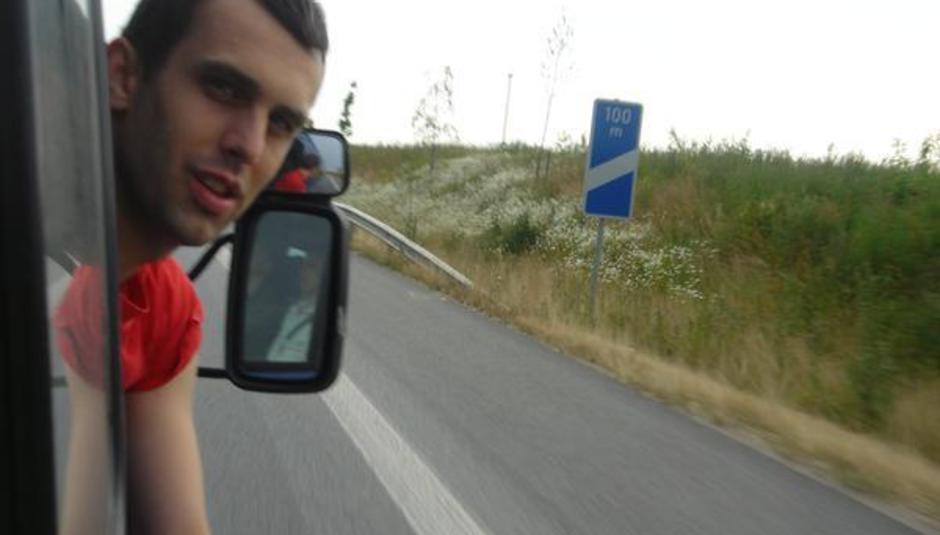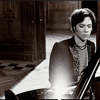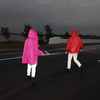Canadian singer-songwriter Joel Gibb hasn't earned the reputation as one of the most outspoken men in music by chance. As the main mouthpiece of The Hidden Cameras, he's been writing about controversial subjects for a decade, spanning five albums of critically acclaimed orchestral pop.
His band's most recent album, Origin:Orphan, again received a modicum of praise while current single 'Underage' recently acquired the accolade of Single Of The Week from our very own 45 queen Wendy Roby.
Having just completed a tour of the UK, DiS thought it most appropriate to catch up with Gibb before he heads off back to his current homebase of Berlin. As expected, we found him charming and forthright in his opinions, particularly on his band's perception within the UK music press...hmmm.
DiS: How has the tour gone so far, particularly the UK leg?
Joel Gibb: Pretty good. The shows have been really good too. Last night in Shoreditch was quite special as we had fourteen string players in this old church.
DiS: St Leonard's Church. Didn't you play there the last time you were over here?
JG: We did but that time it was just the band so more of a rock show and I don't think it worked then as much as last night did. Sometimes when we play churches there's a lack of space so we can't turn the shows into orchestral events but last night was an exception, and I think it was possibly the best show of the whole tour. If it's a really cavernous church it is so much better when we play it unplugged. As well as the strings, we had five horn players, an oboe player and even our manager Craig was onstage.
DiS: A lot of your shows do tend to take place in unconventional venues and locations. Do you feel this enhances the band from a live perspective?
JG: Definitely. That's how the band started, as a performance art collective in Toronto. I would produce the shows and talk to the church about organising the PA etc. We still believe that the more interesting and less conventional the venue the better the show will be.
DiS: You don't seem to tour as much these days though either. Is that because you find it difficult to organise or even enjoy as much as when the band first started?
JG: There are some things I hate about being on tour. The fact you don't get as much time to vegetate for starters, and the whole process can just be tiring like nothing else on earth. At the same time, once you get into the groove of being on tour it can be enjoyable - it normally takes a week or so for me.
DiS: I guess by the time you start to enjoy it it's nearly over.
JG: Sometimes, yeah, but I don't wanna talk about the negative side of touring, let's get back onto something positive instead!
DiS: You're now based in Berlin, but most of the band are still based in Toronto. How do you manage to get everyone together for rehearsals and recording ventures etc?
JG: Well we don't rehearse for starters. I think we've rehearsed once as a band before this tour and it was awful. They were jet-lagged, I was quite sick at the time...I always get a pre-tour cold or something. The current band are actually based in various locations. Jamie, the violinist, lives in London, and then there's Jens who's based in Munich. The European tours are always a melange of Europeans and Canadians - I guess it doesn't really make sense but then I've never been one for doing things according to the rule book.
DiS: You've never really settled on a stable line-up for The Hidden Cameras from the start.
JG: It's not the same line-up every time. Half the band from three years ago are away finishing their Masters degrees so I had to bring in some new people for the last record and tour. There is no clear definition as to who is in The Hidden Cameras other than myself.
DiS: You have collaborated with many musicians in the past who've gone on to achieve success in their own right. Does it concern you that maybe some musicians do see a role in The Hidden Cameras as something of a stepping stone towards furthering their own careers?
JG: I like playing music with lots of different people, and I think it can become really stagnant if you just work with the same group of people year in, year out. I like variety, and that's why you'll find almost every kind of musician across our records and various live shows. I do feel like I've played with almost half of Toronto at one time or another, but I guess that's the incestual [sic] nature of the scene there.
DiS: The Hidden Cameras has been called your solo project by observers and commentators on more than one occasion. Is this how you view it or do you see that as being detrimental to those who've worked on the records and played the live shows?
JG: Whatever people want to call it I'm happy with, I guess. I write all the songs, produce all the records and decide when and where we're going to play, so from that perspective I guess you could call it my baby. I play with so many creative people that I don't consider myself taking anything away from them either. Most of them have their own projects as well as working with this band. I finally had my first experience of being a session player recently. I'm doing backing vocals for Feist, and it took three weeks of solid rehearsals which was great, if hard work, but it was also quite an experience seeing how other musicians put together their own arrangements and actually being a part of that. Everybody that she brought into that process similarly do their own thing as well. The keyboard player works with Beck, Gonzales is a renowned songwriter and musician in his own right and so on and so forth, so it was a similar vibe to what we have with The Hidden Cameras, all these special people coming together to realise her music and new direction.
DiS: I guess that illustrates your versatility as a musician, and further emphasises the point that The Hidden Cameras are an impossible band to categorise musically.
JG: I think that's true. I've never been one to listen to any kind of music just to influence the way we sound, or follow one specific artist's work religiously in the hope we may sound like them someday. It's the deep recesses of my teenage years that influence pretty much everything we do. Those formative years between the ages of fourteen and twenty-two account for almost my entire songbook you know. I think when artists start reeling off band names rather than personal experiences as reasons for their existence, it kind of limits their achievements somewhat. I think that is a key aspect of The Hidden Cameras diversity, and if other people want to liken us to other artists then fine, go ahead.
DiS: I guess the most obvious comparisons would be the Sarah Records bands from the late 1980s such as The Field Mice, The Orchids and St Christopher.
JG: I've never actually heard any of those bands yet they always come up in conversation when people talk about The Hidden Cameras, so I guess I really need to check them out. I know of the band Heavenly from the same label, and I can certainly draw several comparisons with what they were doing.
DiS: A lot of your lyrical content has been quite explicit regarding your sexuality and the way it is perceived by certain parts of society. Does it worry you that people may come to expect that from a Hidden Cameras record, and even start to take the lyrics less seriously, almost in a pastiche kind of way?
JG: To me, that's just the first record and half of the second one. I think my songs are so diverse you can't pigeonhole them into one kind of subject matter or genre, both with the music and the lyrics. For some reason, sections of the music press - especially in Britain - seem to be obsessed with having to reference certain things, and it really irritates me. I don't want to keep that kind of agenda running through the band's music yet journalists always ask me this question. There was a review in the Guardian from one of our shows and they called 'Golden Streams' a paean to being urinated on and I felt like personally confronting the writer of the article and saying "that's not what the song is about you ignorant fucker!" It's about getting to heaven through a grid of piss. It isn't about sex at all, and it's so annoying when almost every fucking article I read in England about my band comes from the same angle. It's almost like a Victorian prudent thing and certain journalists seem to be getting off on it and that's why they feel the need to have to talk about it. They blow it up and misconstrue it because of their own sexual repression. I wrote the first record from the perspective of someone who didn't really know who they were at that moment in time. It certainly wasn't meant to be a definitive statement for me as a person or musician. I guess the only difference was that there were no other strong, confident songwriters stating their identity from a gay perspective, and that's where these preconceptions stem from. There are so many different themes on that record - religion for instance being the main one - yet it's always the same one people tend to pick up on.
Video:The Hidden Cameras 'Death Of A Tune'
DiS: Staying with the subject of the music press, your most recent album Origin:Orphan picked up mixed reviews including a less than favourable one here on DiS. Do you pay much attention to negative reviews or does it not bother you what the press say about your music?
JG: No. You're giving me a complex now - do I get worried about this, do I get upset about that. People either get us or they don't, and if they don't then fine.
DiS: So if you could pick a defining moment from your entire career what would it be?
JG: A lot of those things tend to pass me by if you know what I mean. I'd rather look to the future than dwell on things I've done from the past. I don't want to deprive myself by worrying about hindsight or whatever.
DiS: A lot of people would probably argue that The Smell Of Our Own is the one definitive Hidden Cameras album though, certainly in terms of raising people's awareness of your work to a wider audience.
JG: Yeah, I like that record. At the same time though, I wouldn't say I'm not proud of any Hidden Cameras record, and I think all of them sound just as relevant today.
DiS: It must be quite a challenge putting together the live set at times. How do you decide what to include and what to leave out?
JG: With each tour I try to bring some of those forgotten songs into the set, and then inevitably forget old favourites because there are only so many songs you can fit into one hour or whatever. It's nice because you can almost kind of sculpt a similar sounding set, and I think we've achieved that pretty well on this tour, even if we have focused more on Origin:Orphan for obvious reasons. We always play songs from each of the five records, but yeah you're right, it's difficult to know which songs, particularly from the older material, people want to hear every night. It puzzles me how bands like Yo La Tengo or Sonic Youth who've made fifteen or so great albums manage to put together a setlist. How can they remember songs that were written two decades ago? I sometimes struggle to remember how to play the newer stuff!
DiS: Did you know your music has inspired two DJs from London who perform under the name Music Is My Boyfriend?
JG: Really?!? No, I wasn't aware of that. Wow.
DiS: How does it feel a decade on from your first record to be sat here today talking about your fifth album and how you've inspired other artists and musicians over the years?
JG: Unexpected, surprising, but obviously nice. I'd never even played music with anybody until my friends booked me to play at my first show all those years ago. It's been a process about personal dynamics but also one of learning how other musicians work and cope with the pressures of touring. I think I grew up after that first show. People in Toronto started talking about it and within two years we were signed. I never played music in high school - no one ever asked me to join their band. I don't think even my closest friends at the time knew I was even writing music back then.
DiS: Are there any plans in place for the follow-up to Origin:Orphan?
JG: Well, there are two records already done and just sitting around. Plus Origin:Orphan was never intended to be an album as such. They were just odd songs that we had left over from different sessions. The initial track recordings of 'He Falls To Me' and 'Colour Of A Man', for example, both date back to when we were making Awoo, and the ideas for the other songs just came at different times rather than consciously being intended to form one album. Of the two unreleased records, one is very rootsy, the main focus of instrumentation being pedal steel guitar and banjo, while the other I'd say is actually quite experimental compared to anything I've been involved with in the past.
DiS: Are there any proposed released dates for either?
JG: Not really at this stage. We're on tour at the minute and then we'll have a break for a while. It was the same when we toured Awoo really. I knew there were a batch of songs ready to go, but at the same time there was no real rush to get them out there. All I can say at this stage is that both records will definitely come out. I just can't say when that will be...
DiS: Finally, what are your plans for the rest of this year?
JG: We've some festivals planned in Austria and Germany. One country where we've never played that kind of event is England. We got invited to headline something last summer, but then nothing came of it so maybe you guys don't want us over here after all!
---






















